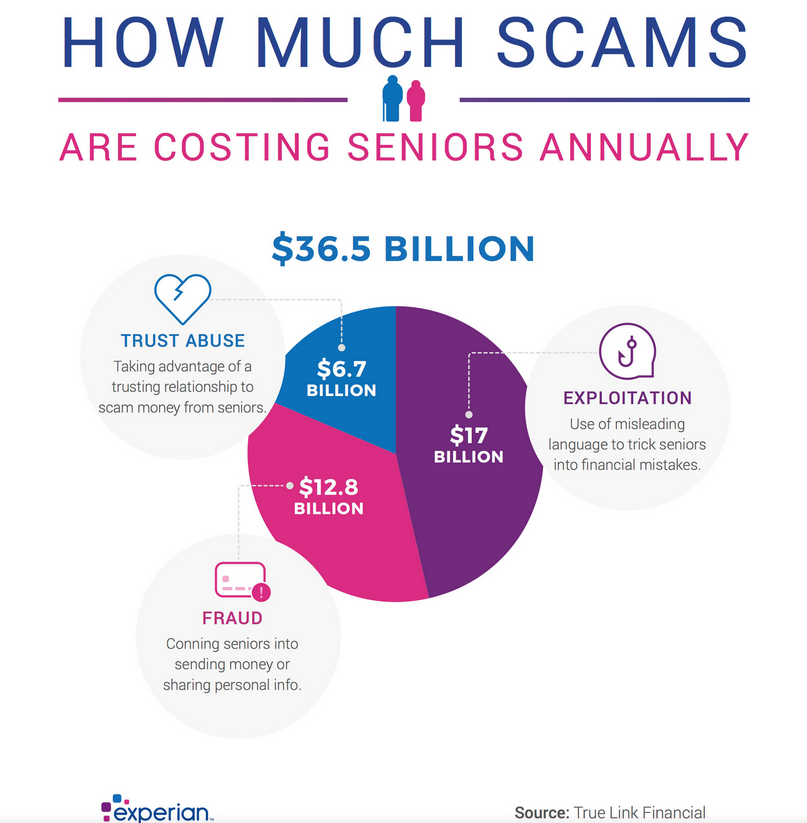Safety. Security. Longevity.
Senior Financial Exploitation
Older adults are increasingly becoming targets for senior financial abuse. As people over 50 years old control over 70 percent of the nation’s wealth, fraudsters are using new tactics to take advantage of retiring baby boomers and the growing number of older Americans.
Financial exploitation occurs when a person misuses or takes the assets of a vulnerable adult for his/her own personal benefit. This frequently occurs without the explicit knowledge or consent of a senior or disabled adult, depriving him/her of vital financial resources for his/her personal needs. Assets are commonly taken via forms of deception, false pretenses, coercion, harassment, duress and threats.

A study published in 2011 by MetLife Mature Market Institute estimates the financial loss by victims of elder financial crimes and exploitation exceeds $2.9 billion dollars annually. However, a more recent study by True Link found that senior financial abuse and exploitation costs Americans over $36 Billion per year! …over 12 times previous estimates.
Safety. Security. Longevity.
Age Safe® America
Since 2015 a national membership, training, advocacy and services organization.
Commonly reported forms of financial exploitation reported to Adult Protective Services agencies
- Theft: involves assets taken without knowledge, consent or authorization; may include taking of cash, valuables, medications other personal property.
- Fraud: involves acts of dishonestly by persons entrusted to manage assets but appropriate assets for unintended uses; may include falsification of records, forgeries, unauthorized check-writing, and Ponzi-type financial schemes.
- Real Estate: involves unauthorized sales, transfers or changes to property title(s); may include unauthorized or invalid changes to estate documents.
- Contractor: includes building contractors or handymen who receive payment(s) for building repairs, but fail to initiate or complete project; may include invalid liens by contractors.
- Lottery scams: involves payments (or transfer of funds) to collect unclaimed property or “prizes” from lotteries or sweepstakes.
- Electronic: includes “phishing” e-mail messages to trick persons into unwittingly surrendering bank passwords; may include faxes, wire transfers, telephonic communications.
- Mortgage: includes financial products which are unaffordable or out-of-compliance with regulatory requirements; may include loans issued against property by unauthorized parties.
- Investment: includes investments made without knowledge or consent; may include high-fee funds (front or back-loaded) or excessive trading activity to generate commissions for financial advisors.
- Insurance: involves sales of inappropriate products, such as a thirty-year annuity for a very elderly person; may include unauthorized trading of life insurance policies.
Source: The National Adult Protective Services Association (NAPSA)

Safety. Security. Longevity.
Age Safe® America
Since 2015 a national membership, training, advocacy and services organization.
Tips for Seniors. What should you do to protect yourself?
- Plan ahead to protect your assets and to ensure your wishes are followed. Talk to someone at your financial institution, an attorney, or financial advisor about the best options for you.
- Shred receipts, bank statements and unused credit card offers before throwing them away.
- Carefully choose a trustworthy person to act as your agent in all estate-planning matters.
- Lock up your checkbook, account statements and other sensitive information when others will be in your home.
- Order copies of your credit report once a year to ensure accuracy.
- Never give personal information, including Social Security Number, account number or other financial information to anyone over the phone unless you initiated the call and the other party is trusted.
- Never pay a fee or taxes to collect sweepstakes or lottery “winnings.”
- Never rush into a financial decision. Ask for details in writing and get a second opinion.
- Consult with a financial advisor or attorney before signing any document you don’t understand.
- Get to know your banker and build a relationship with the people who handle your finances. They can look out for any suspicious activity related to your account.
- Check references and credentials before hiring anyone. Don’t allow workers to have access to information about your finances.
- Pay with checks and credit cards instead of cash to keep a paper trail.
- Feel free to say “no.” After all, it’s your money.
- You have the right not to be threatened or intimidated. If you think someone close to you is trying to take control of your finances, call your local Adult Protective Services or tell someone at your bank.
- Trust your instincts. Exploiters and abusers often are very skilled. They can be charming and forceful in their effort to convince you to give up control of your finances. Don’t be fooled—if something doesn’t feel right, it may not be right. If it sounds too good to be true, it probably is.
Source: American Bankers Association
